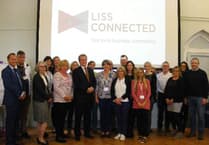Last summer I had the privilege of catching up with East Hampshire residents Rachael, Ken, and Max Ross.
Our conversation centred around their charity, the Portsmouth Down Syndrome Association, which Rachael and Ken founded after their son Max, the youngest of three boys, was diagnosed with Down syndrome.
The charity was set up to address what they saw as a significant gap in specialist support for children born with Down syndrome.
Their mission focuses on ensuring equality of opportunity for more than 47,000 with Down syndrome in the UK. This spans a wide range of initiatives, from specialised training for teachers and tackling workplace prejudice to amplifying the voices of Down syndrome actors in mainstream films.

Ken and Rachael are also Bafta Inclusion leads and have produced films that cast actors with Down syndrome in powerful lead roles. The rise of stars such as Tommy Jessop is already challenging outdated stereotypes.
One of their most significant victories was the passage of the Down Syndrome Act, a groundbreaking piece of legislation that became law two years ago.
This was the world’s first such law, with the hope that it will serve as a framework for other learning disabilities and a model for other countries.
Rachael and Ken are already expanding their outreach efforts, including in places like Ukraine. They have also been approached by the Ethiopian Ambassador to see what can be done to improve legislation and outcomes across the African Union.
The Act officially recognises Down syndrome as a minority group, meaning that public bodies must consider the specific needs of individuals in the delivery of their services.
A key ally was Sir Liam Fox, who chose the Down Syndrome Bill as his Private Members' Bill. His support was crucial in rallying MPs across political lines to get the Bill passed.
The Ross family’s work has brought about tangible change, rooted in their own personal experience. Describing their achievements as groundbreaking doesn’t quite do justice to what they’ve accomplished.
Since the summer, I have had the honour of becoming more involved with Rachael and Ken’s work through the All-Party Parliamentary Group on Down syndrome.
As co-chair, it is a privilege to pick up on Sir Liam’s work; the next critical phase needs to be the publication of supporting guidance for the Down Syndrome Act. This phase is pivotal, as it will outline the responsibilities of health boards, schools, and other public bodies in implementing the new law.
It’s a challenging task, requiring a range of voices to come together to create a unified document.
Despite the challenges that lie ahead, I am confident that with Rachael and Ken leading the way, they will continue to make significant strides.
They’ve already done more to shift perceptions of Down syndrome than most could ever imagine.
.jpg?width=752&height=500&crop=752:500)





